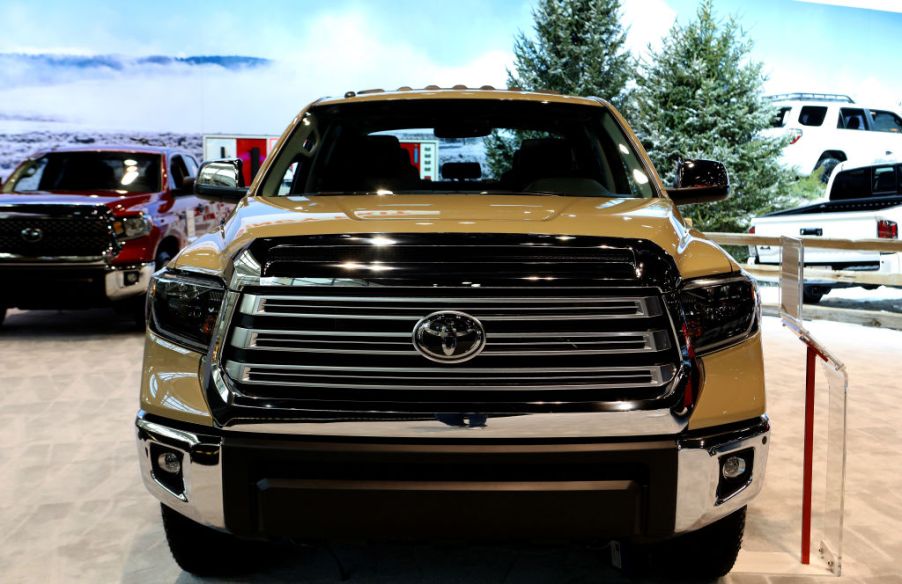
Does Toyota Make a Heavy-Duty Truck?
Toyota trucks have revolutionized the smaller, lighter-truck segment for decades now. The agile, dependable, and economical light-duty trucks offered by Toyota have helped to create a currently over-competitive market for compact and midsize pickups. But does Toyota even offer a heavy-duty option? And why is that we may never see a Toyota heavy-duty truck on the roads?
Does Toyota make a heavy-duty truck?
In the pickup truck market, light-duty trucks take up a large portion. According to AutoTrader, light-duty trucks are often bought by consumers with “only personal or light commercial truck needs.”
Most trucks that fall into this category have a payload capacity of up to 3,000 lbs and an average towing capacity of roughly 12,000 lbs. Heavy-duty pickups, on the other hand, are much larger and can have payload capacities of more than 6,500 lbs and towing capacities of more than 20,000 lbs.
Most truck makers have both light — and heavy-duty trucks in their lineup, including the three, American truck giants: Ford, Chevrolet, and Ram. Examples of heavy-duty trucks include in the F-250/350 and Chevrolet 2500/3500.
Examples of light-duty trucks include the Nissan Titan, Ford F-150, and Chevrolet Silverado. Only Honda and Toyota remain as the last light-duty-only truck makers. And Toyota’s smaller trucks have been popular for years. Both Toyota’s smaller Tacoma and larger brother Tundra simply don’t have the same heavy-duty capacities as its best-selling rivals. Will we ever see a heavy-duty truck on Toyota’s lineup?
Here’s why we may never see a heavy-duty truck come from Toyota
Though neither of Toyota’s current trucks are considered heavy-duty, it seems to make sense for Toyota to keep expanding its truck lineup. Both the Tacoma and Tundra have had decent sales, and consumers seem to be loyal to the Toyota brand, even without its offerings of an extra-large variant. But according to BestRide.com, there are quite a few reasons why Toyota probably won’t be venturing into the heavy-duty sector any time soon.
Logistically speaking, Toyota is having no problem maximizing production. In recent years, production has been ramped up to create more of its light-duty trucks. With plant production at a maximum, Toyota simply has no space to successfully add a heavy-duty to its lineup.
And because Toyota’s production is at an all-time high, the cost associated with creating a bigger, heavy-duty truck just wouldn’t be worth it to Toyota. Almost everything about engineering a heavy-duty truck is different, making it possible that an investment into the idea could grow “into the many billions.”
As BestRide.com experts point out, making a mark against the ultra-competitive, heavy-duty truck market could prove an impossible task.
Capabilities of Toyota’s light-duty truck lineup
The 2020 Toyota Tacoma has a towing capacity of up 6,800 lbs, according to PickupTrucks.com. Combined with its average payload capacity of around 1,155 lbs (depending on configuration), the Tacoma is the second-least capable pickup of its segment. Its larger sibling, the 2020 Tundra, has a towing capacity of right around 10,000 lbs and a max payload capacity of more 1,500 lbs, according to Edmunds.
And even though Toyota may not be able to compete with size and tow-capacity, its trucks can still perform. According to Trucks.com, the Toyota Tundra earned J.D Power’s highest score out of any full-size, light-duty pickups in its 2019 U.S. Vehicle Dependability Study.
While the smaller Tacoma didn’t receive the same honor, it does currently stand as the best-selling midsize truck in the U.S. and Toyota as a brand, stood as the second-highest-scoring brand in dependability. Maybe that is why Toyota is focused on doing what it knows.


